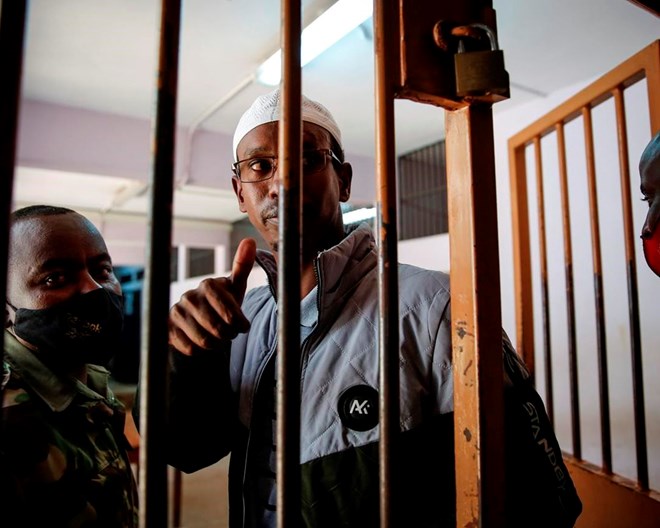
Friday October 9, 2020

Liban Abdullah Omar, who was found innocent of supporting the gunmen involved in the Westgate Mall attack in Sept. 2013, gestures after the verdict was delivered in the trial at Milimani court in the capital Nairobi, Kenya Wednesday, Oct. 7, 2020. A Kenyan court on Wednesday found two men guilty of supporting the 2013 attack by gunmen with the Somalia-based extremist group al-Shabab on Nairobi's upscale Westgate Mall that left 67 people dead, while Chief Magistrate Francis Andayi acquitted a third suspect. BRIAN INGANGA / AP PHOTO
NAIROBI, Kenya - A Kenyan lawyer said gunmen he suspects were security officials wearing black balaclavas abducted his client on Thursday shortly after he was acquitted of supporting the 2013 extremist attack on the Westgate Mall that left 67 people dead.
Mbugua Mureithi said gunmen abducted his client Liban Omar five minutes after his release. He had been acquitted on Wednesday after spending seven years in custody.
Two other suspects, Mohamed Ahmed Abdi and Hussein Hassan Mustafah, were found guilty of charges including conspiracy to commit terrorism by assisting the al-Qaida-linked al-Shabab terrorist group.
The attack by four gunmen with the Somalia-based al-Shabab was the first large-scale assault in Kenya’s capital. Al-Shabab has vowed retribution on Kenya for sending troops to fight the group in Somalia since 2011.Mureithi said Omar had been released by prison authorities, but as is the procedure with all suspected extremists, he was handed over to the Anti-Terrorism Police Unit before being released from custody.
Mureithi said as soon as Omar left the ATPU headquarters with four relatives, a black car blocked their taxi and the armed men surrounded it.
“The women said when they started screaming they were told to shut up by the armed men who said they were with the security agencies,” Mureithi said. “It would suggest they (security agencies) were not happy with the outcome of the case.“
Nairobi police chief Rashid Yakub said they are looking into the Omar’s abduction but added the accusation that police were involved was “speculation.”
According to a police reconstruction of the 2013 attack, the four gunmen who attacked the mall split into two groups. One went through the mall’s main entrance and another went through the vehicle entrance, tossing grenades and spraying bullets.
Kenya’s police and army were widely criticized for their response to the attack. It took at least two hours before the police tactical team went into the mall, leaving security guards and volunteers to fend for those inside.
Lack of co-ordination between the military and police led to friendly fire in which one police officer was killed and the police tactical team withdrew leaving the military who were ill-equipped to tackle the terrorists.
Four military men were killed by the gunmen as the siege extended to nearly four days before the army allegedly blew up the area the attackers were hiding in leading to a fire that collapsed part of the mall. The four attackers died of smoke inhalation, according to autopsy results.
The attackers were identified as Yahye Osman Ahmed, Ahmed Hassan Abukar, Hassan Mohammed Dhuhulow and Mohammed Abdi Nur.
Authorities claim Omar’s brother Hassan Abukar was one of the four attackers who died in the Westgate Mall attack.
But according to Omar’s family, Abubakar had gone to Libya a few days before the terror attack, Mureithi said.
“In fact he left Omar his mobile phone which he was using freely leading to his arrest! Abukar has never been seen or heard of since,” Mureithi said.
Human rights groups have for long criticized for Kenyan authorities for violating fundamental rights while implementing counter-terrorism initiatives.